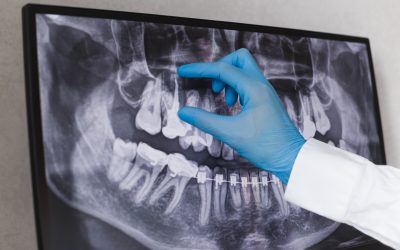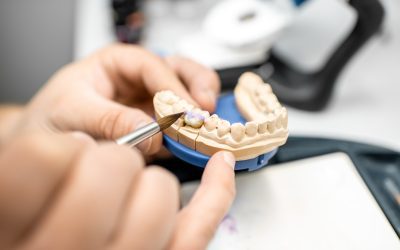In order to maintain optimal oral health, it's crucial to find a knowledgeable, skilled, and trustworthy dentist. So, how do you tell a good dentist from a bad one?
A good dentist prioritizes the well-being of their patients by focusing on prevention and providing comprehensive treatment plans. On the other hand, a bad dentist may prioritize their earnings over the patient's health, offer poor quality of care, or fail to establish a comfortable and hygienic environment. Discerning between a reliable and an untrustworthy dentist can be challenging. Still, with the proper guidance and understanding of key characteristics, one can significantly increase their chances of finding a qualified dental professional.
Understanding The Characteristics of A Good Dentist
A good dentist possesses a combination of skills and qualities that make them trustworthy and competent in their job. One key aspect to consider is their reputation, which can be gauged through recommendations from friends, family, or online reviews. A well-recommended dentist is more likely to provide satisfactory service and care.
Trust is another essential factor for determining a good dentist. They should communicate honestly with patients, providing clear explanations about treatment plans and addressing any concerns that may arise. Transparency in billing and pricing is also essential, as it ensures patients are not overcharged or faced with unexpected fees.
Dentists' competency is demonstrated through their ability to diagnose and treat various dental issues accurately. They should stay up-to-date with the latest advancements in dentistry and adhere to best practices for the overall well-being of their patients. When a dentist performs routine examinations and procedures, minimizing pain and discomfort should be a primary goal.
Compassion is a trait that sets a good dentist apart from a poor one. Dental treatments can be scary and stressful for patients, so a dentist's empathy and understanding can go a long way in creating a more pleasant experience. A good dentist will patiently address patient fears and concerns, working with them to develop a comfortable treatment plan.
Finally, the dental team significantly influences an overall positive dental experience. A good dentist will have a team of skilled professionals, including hygienists and dental assistants, who work together to provide the best possible care. Effective communication and collaboration within the dental team are crucial for ensuring an easy and successful treatment process.
By considering these factors—recommendations, trust, competence, honesty, communication, compassion, and the dental team—you can better identify how do you tell a good dentist from a bad one. And who will provide the highest level of care for your oral health needs.

Sources For Finding A Good Dentist
Referrals And Recommendations
One of the most reliable ways to find a good dentist is through personal referrals and recommendations from family, friends, and colleagues. Their experiences can provide valuable insights into a dentist's quality of care, professionalism, and overall patient satisfaction. By receiving firsthand information from people you trust, your search for a good dentist becomes simpler.
Online Reputation
Another important point to consider when choosing a dentist is their online reputation. Websites such as Yelp, Google Reviews, insurance websites, and even social media platforms can provide a great deal of information about a dentist's practice. By browsing reviews and testimonials left by previous patients, you can gather a clearer picture of the dentist's skills, bedside manner, and overall competence. However, keep in mind that negative reviews should be taken with a grain of salt – it's essential to look for trends and patterns in the feedback to make an informed decision.
American Dental Association (ADA)
The American Dental Association (ADA) is a reputable organization that has been serving the dental profession for over a century. By using their online directory, you can search for dentists in your area who are members of the ADA. Dentists in this organization are committed to complying with specific ethical and professional standards, ensuring that you receive top-quality dental care.
In addition to the ADA, it's also beneficial to consult your local dental society, as they can provide information on registered dentists in your area. This can be an excellent starting point in narrowing down your search and ensuring you choose a dentist recognized by professional dental boards.

First Impressions And Office Ambience
When visiting a new dental office, it's important to take note of the first impression they give. This includes assessing the appearance of the office and the friendliness of the staff. A well-maintained, clean, and welcoming environment will usually indicate that the dentist takes pride in their work and puts effort into ensuring the best possible care for their patients.
The appointment process can also provide insight into the quality of a dental practice. A good office should have an efficient and easy-to-navigate appointment system. You should expect a prompt response to your inquiries, as well as courteous and professional communication from the staff. This can help foster a trusting relationship between you and the dental practice.
When evaluating the office ambiance, consider how comfortable you feel in the waiting area. A pleasant and organized space can contribute to a positive overall experience. Pay attention to the staff's demeanor: are they happy, helpful, and attentive? A satisfied and professional team is often a sign of a well-managed practice, which may translate to better care for your oral health.
Assessing Qualifications And Focus
When choosing a dentist, evaluating their qualifications, skills, and oral health focus is essential to ensure their competence in handling dental procedures. A good dentist should have completed the necessary education and training in their field. Additionally, they should have hands-on experience and demonstrate enthusiasm for continuous learning, which translates to better patient care.
Continuous Education
To maintain their competence, a dentist should always engage in continuous education. This can include attending workshops, conferences, and enrolling in advanced dental courses. Dentists committed to continuous education show dedication to their profession and are likely to be more knowledgeable about the most recent advancements in dental care.
In addition, a quality dentist stays current with the latest developments in oral healthcare and employs an evidence-based approach to treatment. For example, they may recommend fluoride treatments to strengthen the enamel and prevent cavities or suggest using antibacterial mouth rinses to counteract gingivitis. This dedication to staying informed demonstrates their commitment to providing the best care possible for their patients.
Skills
In addition to academic qualifications and continuous education, a dentist's dexterity is another crucial skill, as it ensures they can efficiently manage patients without causing unnecessary injuries during tooth extractions or other procedures. Additionally, assessing a dentist's equipment cleanliness and their approach to minimizing patient pain can also offer valuable insights into their overall competence.
Oral Health and Prevention
A good dentist emphasizes the importance of oral health and prevention. They teach their patients proper oral hygiene practices, which include brushing and flossing, to maintain optimal dental health. Dentists help patients prevent gum disease, tooth decay, and other oral health issues by providing guidance on techniques.
One crucial aspect of oral healthcare is regular checkups. A dentist focused on prevention will recommend routine visits to monitor the patient's oral health, identify potential problems, and address any concerns early on. This proactive approach allows for early intervention and treatment, thereby avoiding the need for more invasive procedures in the future.
Dentists who prioritize prevention and oral health maintenance will also invest in advanced technology and equipment to diagnose and treat their patients in a more effective manner. By prioritizing prevention, these professionals can better serve their patients and help maintain optimal dental health.

Looking At The Treatment Plan
A good dentist will provide a clear and comprehensive treatment plan tailored to the patient's individual needs. This plan should detail the dental work required, including procedures for treating cavities, root canals, cleanings, crowns, and implants. When a dentist presents a treatment plan, here are some factors to consider:
- Transparency: A reputable dentist should be transparent about the necessity of each procedure, including the risks and benefits, and should not pressure patients to undergo unnecessary treatments. For example, if a dentist suggests a complete set of X-rays despite having recent X-rays, the patient should question why this is necessary.
- Communication: The dentist should be responsive to a patient's questions and concerns about the treatment plan, explaining every step and offering reasonable alternatives if applicable. A good dentist will also educate patients about preventative measures and proper oral hygiene to minimize future dental work.
- Patient Empowerment: Dental patients have the right and responsibility to evaluate whether the proposed treatment plan is appropriate for their specific needs. A trustworthy dentist will encourage patients to ask questions and actively manage their oral health.
- Costs: A reliable dentist will provide detailed cost estimates for each procedure, including potential insurance coverage and possible financing options. Be wary of dental practitioners who offer unclear pricing or push treatments that may not be covered by insurance without proper justification.
By paying close attention to the proposed treatment plan and the dentist's communication style, patients can differentiate between competent practitioners and those more interested in their financial gain. Remember, feeling comfortable with your dentist and trusting their expertise when addressing your dental needs is essential.
Payment And Insurance Matters
When choosing a dentist, it's essential to consider payment and insurance matters. A good dental practice will have clear and transparent policies regarding the acceptance of dental insurance and payment options.
Ensure the dentist is an in-network provider for your dental insurance, meaning they have agreed to provide services at pre-negotiated rates with your insurer. This can significantly reduce your out-of-pocket costs. Additionally, verify that the dentist accepts your specific dental insurance plan before scheduling an appointment.
Payment matters are crucial as well. A reputable dentist will offer a variety of payment methods, including cash, credit cards, and debit cards. Some practices also provide payment plans which allow patients to pay for their dental treatments in installments, making it more manageable, especially for those without dental insurance or facing significant costs. Inquire about the availability of these plans, and review the terms and conditions thoroughly before committing.
When receiving a dental bill, it should be easy to understand and accurately itemize all the treatments and services provided. A reliable dentist will be willing to review the charges with you and answer any questions about the costs involved. Be cautious if you encounter a dentist who tries to push unnecessary procedures or additional treatments that significantly increase your bill without adequate explanation.

Identifying Red Flags
When searching for a good dentist, one must be aware of potential red flags indicating a lesser quality or even dishonest professional. Identifying these warning signs could help you avoid unnecessary procedures and make a more informed decision about your dental care.
Lacking Proper Credentials
One major red flag is a dentist lacking proper credentials. A valid dental license and adequate education are essential for ensuring a high level of care. Be sure to verify their qualifications before proceeding with any treatment.
Specials and Promotions
Dental clinics that heavily rely on promotions and deals may also be a cause for concern. While occasional discounts are not unusual, a dental practice that consistently advertises specials could be focusing more on income than your oral health. Always research and consider the reputation and patient reviews of the dental practice before accepting any offers.
Unprofessional Office Environment
An unprofessional office environment can also be indicative of a bad dentist. An untidy or disorganized workspace might suggest a lack of care and could potentially impact the quality of service provided. Moreover, dentists who disregard your concerns or do not adequately address your questions may lack sufficient communication skills essential for a successful patient-dentist relationship.
Phantom Treatments
Phantom treatments refer to dental procedures a bad dentist may suggest are necessary when they are not. These procedures can be costly and invasive, further damaging the patient's oral health or causing unnecessary discomfort. Examples of phantom treatments may include excessive X-rays and unneeded dental fillings. If a dentist frequently recommends unwarranted treatments, it is essential to seek a second opinion or consider switching dentists.
Recognizing red flags that may indicate a bad dentist or fraudulent practices is essential. By paying attention to these red flags, you can confidently choose a reputable, knowledgeable, and trustworthy dentist for your oral health needs. Remember to do thorough research and always trust yourself when it comes to choosing the right professional for your dental care.
The Importance Of Getting A Second Opinion
Seeking a second opinion from another dentist is an essential step for anyone who encounters a new dental issue or is uncertain about the suggested treatment plan from their current dentist. This practice is especially crucial after a first-time visit with a new dentist when building trust is still in progress.
When a patient is informed about the need for procedures they have never required before, it is a wise decision to consult another dentist for an additional perspective. For instance, if a person rarely experiences cavities but suddenly needs numerous fillings during a first appointment, they should consider it a red flag and seek a second opinion.
A second opinion can also help address poor communication between the patient and their dentist. A lack of clear explanations about the proposed dental work and its necessity can leave patients feeling doubtful. In such cases, it is valuable to have another dentist evaluate the situation, provide a clear understanding of the dental issues, and offer alternative treatment options if needed.
Moreover, having multiple professional opinions allows patients to compare and contrast their suggested treatment plans, weigh the pros and cons, and make a well-informed choice. This approach can potentially save patients time, money, and discomfort by avoiding unnecessary procedures and finding the most suitable treatment plan tailored to their individual needs.

How Do You Tell a Good Dentist from a Bad One Wrap-Up
Good dentists are committed to providing the best possible care for their patients, prioritizing the patient's overall well-being rather than focusing on their own financial gain.
A dentist's qualifications, along with their office ambiance, treatment plan, and approach to oral health, can provide valuable insights into their practice.
Another key indicator of a dentist's quality is their ability to minimize patients' pain during treatments. Proficient dentists should be gentle in their approach and ensure their patients feel comfortable throughout the process. Additionally, a good dentist should maintain a clean and hygienic office space, as well as properly sterilize all their equipment.
On the other hand, warning signs of a bad dentist may include promoting unnecessary procedures or packages. This may be a tactic to boost their revenue rather than focusing on the actual needs of their patients. Furthermore, seeking a second opinion can help ensure that the suggested treatment is necessary and appropriate.
Understanding how do you tell a good dentist from a bad one is crucial for maintaining good oral health. By paying attention to the key factors mentioned above and doing thorough research, individuals can confidently select a dentist who is both skilled and trustworthy and also aligns with their needs and expectations.
Frequently Asked Questions
What are the signs of a competent dentist?
A competent dentist is able to provide quality treatment while minimizing a patient's pain, uses clean and sterilized equipment, and abides by ethical standards. Good dentists are genuinely concerned about the overall health of their patients and continuously update their skills and knowledge. They also provide clear and concise explanations of diagnoses and treatment options.
How can I verify a dentist's qualifications and experience?
To verify a dentist's qualifications, check with the regulatory dental board or licensing authority in your country or state. Additionally, you can visit the dentist's website, read their public profile, or ask for their professional credentials and experience during your initial consultation.
Do good dentists prioritize preventive care?
Yes, good dentists recognize the importance of preventive care, including regular dental checkups, cleanings, and education on oral hygiene practices. They work with patients to identify potential dental issues early and provide guidance on maintaining optimal oral health.
What role does patient communication play in assessing a dentist?
Effective patient communication is essential in evaluating a good dentist. A quality dental professional should patiently listen to patient concerns, provide clear explanations of treatment options, and ensure patients understand their dental health status. The ability to create trust and rapport is paramount to a successful dentist-patient relationship.
How can I evaluate the cleanliness and organization of a dental office?
Visiting a dental office before scheduling an appointment provides an opportunity to evaluate the facility's cleanliness and organization. Pay attention to the tidiness of the waiting area, sterilization policies for dental equipment, and the overall hygiene of the office. A well-managed dental office shows commitment to patient safety and comfort.
Are online reviews and recommendations a reliable way to find a good dentist?
While online reviews can be a beneficial source, they should not be the only criteria for choosing a dentist. It's crucial to consider other factors such as professional qualifications, experience, communication style, and facility cleanliness. Asking friends, family members, or colleagues for their personal experiences and recommendations can also help in finding a trustworthy dentist.




